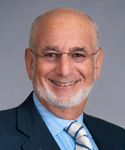
- rfeinberg@ucsd.edu
-
RBC #1424
9500 Gilman Dr. #0519
La Jolla , California 92093-0519
Professor Emeritus

Richard Feinberg is a professor of international political economy at the School. He has enjoyed a distinguished career as diplomat, policy advisor, corporate consultant, university professor and author of over 200 books and articles on international relations. His four decades of engagement with United States foreign policy spans government services — in the White House, Department of State and Department of the Treasury — numerous Washington-based public policy institutes, the Peace Corps in Chile and, now, academia.
Feinberg is an authority on U.S. foreign policy, multilateral institutions (IMF, World Bank, NAFTA) and summitry (APEC, Summitry in the Americas, G-8). He is an expert on trade and investment, globalization, democratization and non-governmental organizations.
As a non-resident senior fellow at the Brookings Institution, Feinberg authored reports assessing Cuba’s economic reforms on foreign investment, the country’s private enterprise and the emergence of its middle class, and solutions to U.S. property claims dating from the 1960s; and published Open for Business: Building the New Cuban Economy (2016).
Some major accomplishments include publishing “The Triumph of Allende” at age 24; joining the Carter administration to focus U.S. foreign policy toward the promotion of human rights and democratic freedoms; publishing “The Intemperate Zone: The Third World and the Challenge to U.S. Foreign Policy”; serving as the principal architect of the 1994 Miami Summit of the Americas for the Clinton Administration; and since 2005 has written over 300 reviews for the Western Hemisphere book review section of Foreign Affairs magazine.
Ph.D., International Economics, Stanford University, 1978
University College, University of London. Concentration in British history
B.A., European History, Brown University, 1969
Biographical Sketch
“Reaching Out: Cuba's New Economy and the International Response"
Richard Feinberg (UC San Diego)
The Brookings Institution (2011)